TUM Think Tank
Where today's societal challenges meet tomorrow's technological excellence.
How can we make abstract technologies such as quantum technologies tangible?
At first glance, art and technology may seem to be separate fields. However, new technologies often inspire creativity in the arts and continually expand its horizons. Moreover, art offers unique and sometimes surprising perspectives on technological advances, revealing the deep connection between the two.
At the QuantWorld project, we firmly believe that art can serve as a translator to make the often elusive concepts of quantum technologies and their impact on our everyday lives tangible and that a holistic approach including thoughts of responsibility and consciousness can improve further developments.
This is the reason for our decision to include artistic interventions and artists prominently in the project.
We are excited to work with a group of remarkable artists whose artistic interventions bring a unique perspective to the abstract world of quantum technologies. It is our belief that, through this creative approach, the transformative power of these new technologies can be understood and experienced by everyone.
In our mission to forge innovative paths at the intersection of art and technology, we are also proud to partner up with MATTER and the XR Hub Bavaria. With MATTER, we are developing a unique framework for artistic interventions, while the XR Hub Bavaria helps us bring art to life through immersive extended reality (XR) formats.
Meet our artists
Patrik Hübner
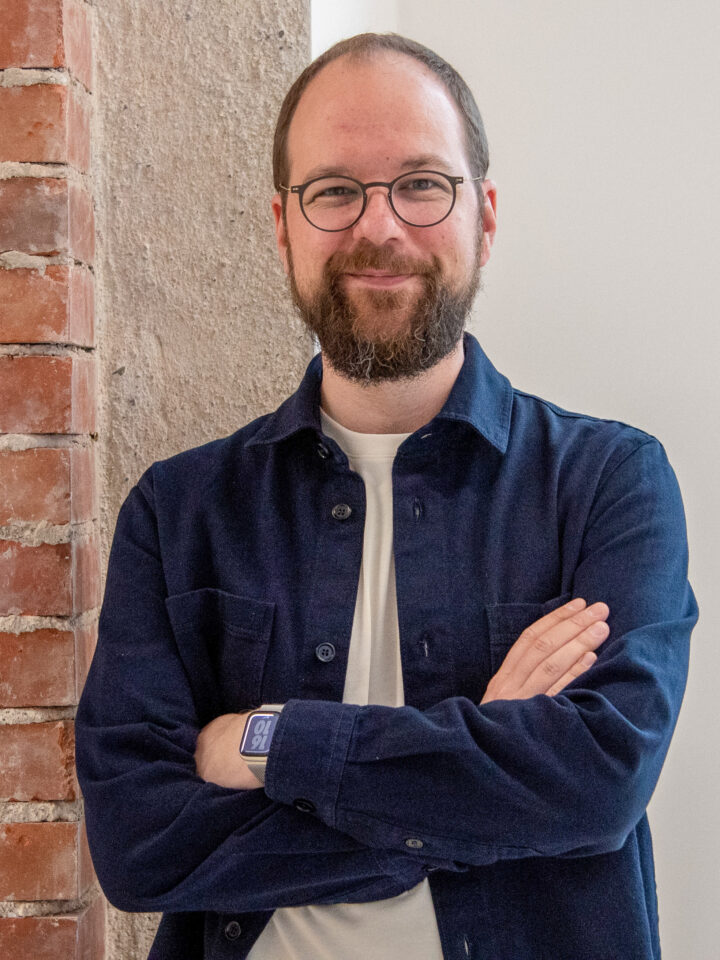
Photo Credit: Larissa Lenze
As a programming designer and creative director, Patrik Hübner has been working at the intersection of brand communication and technology for over 15 years. Working in traditional design for years, he discovered generative design in 2014 and became one of the few individuals to have successfully established this seamless blend of art, design and data into cohesive and compelling design systems and narratives on an international level. Today, he works as a generative designer with international brands, agencies and cultural institutions. As a lecturer at universities, he teaches on the topic of generative design, is a regular keynote speaker and gives workshops.
His clients include Landor & Fitch, Interbrand, Serviceplan, Wieden+Kennedy, The New York Times, Evian and Lexus. Patrik has given talks at Deutsche Telekom, IBM, Publicis, The Atlantic, universities and at events such as re:publica Berlin and Dutch Design Week. Since 2018, his generative work has won over 30 awards, including the ADC Award, the European Design Award, the German Design Award, the D&ADAward, the World Brand Design Award and many more.
https://www.patrik-huebner.com/
Why did you become part of the QuantWorld project?
“To me, art can act as a mediator and translator of complex technological concepts into comprehensible, engaging experiences that can be more easily digested by both individuals and the society as a whole. In this context, my work in the field of generative design – rooted in the interplay of algorithms and human creativity – can surface new perspectives by contributing computational systems that create forms or experiences which react and adapt over time. If used in the context of tangible and emotionally relevant expressions, this approach can spark new conversations within our society about possible and desirable futures as well as ethical considerations of quantum technologies. This process of interaction between design, technology, and societal feedback loops is integral to fostering an informed community that can adapt to and influence technological evolution.
This project is a profound opportunity for personal and professional growth, allowing me to delve deeper into the convergence of art, technology, and design through the lense of quantum technologies. Generative design's systematic, iterative approach – where outcomes evolve through ongoing adaptation and feedback – is a powerful metaphor for my own learning and creative evolution throughout this endeavor.
My artistic and design explorations are significantly shaped by the interplay of technology, data, and human creativity. In this process, I engage with creative coding and generative design as enablers for co-creation, where technology acts not merely as a tool, but as a creative partner. This partnership involves setting initial conditions and rules within which the technology operates—creating an environment where art and design can evolve dynamically and unpredictably in the context of a given topic. The concept of co-creation here is vital; it underlines the collaborative nature of my work where human creativity and machine capabilities complement each other, enabling the creation of complex, adaptive works that respond to and reflect our environment in a contemporary digital landscape. This approach challenges traditional notions of art and design and invites a broader dialogue about the integration of systemic design, data and artificial intelligence in creative expression, ultimately enhancing the depth and breadth of what can be achieved through art and design.
I truly hope to sculpt narratives that illuminate the opaque world of quantum technologies. By transforming abstract concepts into engaging and interactive experiences, this could grant visibility to the arcane processes and (for now) mostly hidden impact of quantum technologies. I believe that a simple depiction of these technologies and their underlying principles is not enough for society to really engage with the complex implications of quantum technologies. So I will work towards forging deeper connections between society and the elusive topic of quantum. By creating stories that are not static but rather evolve and adapt, echoing the interplay of nature, quantum technologies, us as individuals and society itself. I believe it is import to balance simplicity and depth to provoke contemplations on how these technologies might weave into the fabric of our daily lives.”
Anne Kristin Kristiansen

Photo Credit: Sarah Gerats
Anne Kristin is a German-Danish artist, educator and scholar based in the Munich area. Born in Riad, Saudi Arabia, she received her formation in Fine Arts and philosophy in Essen and Witten-H
erdecke, the Ècole nationale supérieure des beaux-arts, Paris and The Royal Academy of Fine Arts, Copenhagen, where she earned her Master’s Degree. Anne Kristin’s work is abstract minimalist and spans sculptures, prints and installations. Her work was displayed, among other places, at Kunsthalle Dortmunder U, Dortmund; KH7, Århus; Kunsthalle Recklinghausen, Recklinghausen; and Museum Kunstpalast, Düsseldorf. Anne Kristin was an artist in residence for example at Statens Værksteder for Kunst, Copenhagen; the sailing expedition ‘The Arctic Circle’; Kiev, Ukraine; and El Bruc, Catalonia. Anne Kristin is pursuing a PhD in philosophy and is also a co-founder of the queer-feminist bookstore glitch in Munich.
http://annekristinkristiansen.com
Why did you become part of the QuantWorld project?
“Art and science have gone hand in hand for many centuries, inspiring futures from different vantage points. Both are ways of conceiving better worlds, and both regularly reflect present concerns and aspirations.
Second generation quantum technologies are extremely interesting to me because of the state of “fragile coherence” they depend on, and the transformative potential that can ensue from such seeming fragility. Personally, I hope to immerse myself in new forms of knowledge creation and exchange in a lively community that can combine scientific, educational, artistic and public aspects.
My own art has a lot to do with translation, and I hope to produce various forms of translations between people, materials and ideas as part of this journey. “
Solimán López
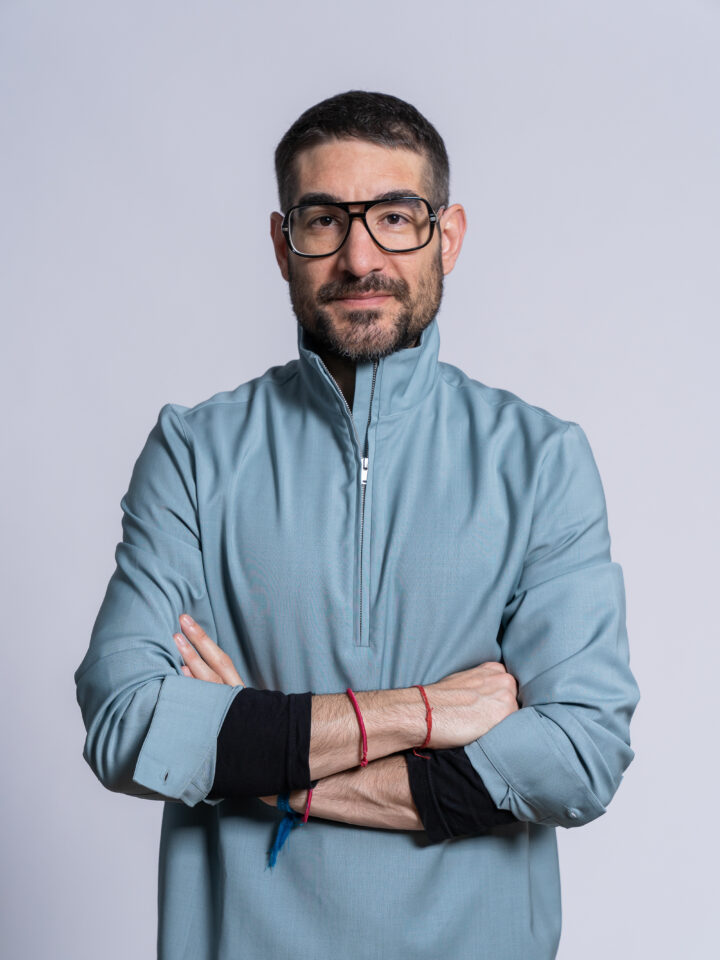
Photo Credit: SLS Studio
Solimán López is a conceptual artist in new media with a focus on biotechnology, artificial intelligence, digital art, and interactivity. He founded the Harddiskmuseum in 2015, introduced the biotoken OLEA, and initiated the Manifesto Terricola movement. His work has been showcased in over 20 countries, spanning museums, festivals, art centers, and galleries. Additionally, his research has been disseminated in universities across more than 20 countries.
Why did you become part of the QuantWorld project?
“I strongly believe that Quantum Computing is a game changer in society, and that the major challenges of our current world have always been addressed by art in the first instance. This is my primary interest in the project: exploring how we can approach this new technology from a critical and analytical perspective, and examining how it could reshape our understanding of art, its production, and the societal implications of the information age.
I am deeply fascinated by the concepts underlying the quantum world, and I also believe that a better and more profound understanding of this technology will aid humanity in comprehending the origins of our species and ourselves. However, we must be mindful to "curate" how society utilizes this powerful tool. Any technology devoid of consciousness can become a weapon, so it is crucial to analyze all the dimensions involved in the dissemination of new ideas and concepts related to this advancement.
I hold hope that, through our collective efforts in the QuantumWorld project, we will collectively attain the expertise necessary to maintain this critical perspective and overview, to be applied creatively, thereby redefining art concepts and adding social value in the process.
Personally, I am incredibly curious to see where this journey will lead us and how my background in art will respond to this new knowledge. My ultimate goal is to delve into the most intriguing aspects of human nature and its relationship with society, envisioning a new and improved future where technology assists humans in overcoming challenges and elevating our levels of consciousness, fostering connections with others and with nature at large.”
Benjamin Nott

Benjamin Nott is a South African architect. He helps people create meaningful spaces and places to share stories and memories. He has been practising architecture for over 20 years. With his wife and partner, they have co-founded:
Blanco Architecture & Design, in 2008; Humanitas |Living Innovation Laboratory, Ticino in 2019 as a multi-disciplinary next-practise case-study for the future of the Architecture, Engineering and Construction Industry. This project has won Horizon Europe and Innosuisse Flagship funding; and
BlancoLAB Virtual Production Studios in 2022, a multidisciplinary team of storytellers that create and curate immersive gamified experiences. BlancoLAB has worked with Siemens, Lucid, Moth Quantum and is working on the research projects; “Quantworld” with TUM School of Social Science and Technology and Fraunhofer AISEC,and the “Resilient-Hydro-Twin” project with TU Delft, the Indian Institute of Technology, Madras and the Eindhoven University of Technology.
Ben is the co-founder of ZERO Construct - https://zeroconstruct.com/ , is a board member of [y]our2040 - https://your2040.com/ , sits on the advisory council of Puzzle X - https://www.puzzlex.io/ , is a thought leader on the “Brains trust” created by the Innovation Foundation powered by the Adecco Group and is a member of Degrowth Switzerland.
His home and studio have been in Valle di Blenio, Ticino in the Swiss Alpssince 2010. He is a man of the sciences, arts and humanities. Architecture for him is an embodiment of all three. Benjamin loves mountain sports, he is a voracious reader and has an appreciation for music, dance, and art. Above anything else he loves an interesting conversation. He brings passion, commitment, and dedication to his projects to make them relevant. He has often been called a “thinking doer.”
Why did you become part of the QuantWorld project?
“I liked the people in the project and the storyline presented to me at the first moment of listening. I loved the fact that there was the willingness to dream and be a little ambitious.
That space between technology and the user is one of the most exciting and daunting places to be. Do you approach it with a tech mindset, or do you approach it with a end-users mindset? I feel the arts have always allowed us to bridge this gap. The impressionists tried to capture the scientific concepts of space and time through painting and Pixar has used technology to drive new media art forms whilst also creating new technologies to express new art forms that have become ubiquitous in our society today.
I wanted BlancoLAB to be a part of this creative bridging and the bringing of people together in a positive manner.”
Meet our partners MATTER and XR Hub Bavaria
XR Hub Bavaria
The XR HUB Bavaria is an initiative to strengthen Bavaria as a media and business location and is funded by the Bavarian State Ministry for Digital Affairs. The project has three locations: XR HUB Munich, XR HUB Nuremberg and XR HUB Würzburg. All HUBs deal with issues relating to XR technologies and their numerous applications.
The XR HUB Bavaria in Munich connects the players in the XR community in Bavaria and beyond with entrepreneurs and people who are curious or want to know how XR will change their working and living environment. It drives the development and dissemination of XR applications, links expertise and promotes the transfer of knowledge and exchange of experience between research & development, industry and the cultural and creative sectors.
Silke Schmidt, Head of XR Hub Bavaria in Munich
 “The XR Hub Bavaria is happy to support the QuantWorld-Project. We are looking forward to the ideas of the artists how to visualize and experience information about quantum computers and their applications etc. with XR-technologies. We will support the project with our knowledge, network, equipment, events and communication measures.”
“The XR Hub Bavaria is happy to support the QuantWorld-Project. We are looking forward to the ideas of the artists how to visualize and experience information about quantum computers and their applications etc. with XR-technologies. We will support the project with our knowledge, network, equipment, events and communication measures.”
MATTER
MATTER is an international Think Tank and Public-Benefit initiative focused on using Exponential Technologies to help solve some of humanity's most pressing challenges. One of its initiatives is PUZZLE X - the world's leading forum for Exponential Technologies & Deep Science for the Future. Supported by the government of Spain, the Generalitat of Catalonia and Barcelona city hall, PUZZLE X 23 convened over 3,000 stakeholders from 64 countries and 52% decision-makers.
More than an event, PUZZLE X is an ecosystem activator and a global agenda-shaping forum, bringing the world's most powerful voices — industry leaders, scientific luminaries, Nobel Laureates, technologists, and policymakers to reveal the power of exponential technology and deep science. It is a catalyst for collaborative initiatives and projects, such as the Quantum Symphony of Biology, Biowaves— storing memories inside DNA, and hbar & the world’s first quantum bartender.
PUZZLE X and MATTER, in partnership with IYQ (International Year of Quantum), launched an Open Letter to encourage the UN to proclaim 2025 as the International Year of Quantum. In November 2023, the first gathering of key quantum stakeholders and Quantum Collective took place at PUZZLE X in Barcelona and showcased the commitment of the global quantum ecosystem for the declaration of IYQ2025. On June 7, 2024, the United Nations proclaimed 2025 as the International Year of Quantum Science and Technology.
In 2024, from the creators of PUZZLE X, comes another experience merging deep science and global thought. XPANSE, the world's first visioning of the future of exponential technology, will take place in Abu Dhabi on November 20–22 and will serve as a driving force for exponential fields such as quantum computing, genomics, synthetic intelligence, next-generation materials, brain-machine interfaces, and fusion energy.
https://www.puzzlex.io/, https://www.xpanse.world/
Zina Cinker, Director General at MATTER
 “Quantum is the way the universe expresses itself, while art is the way humans do. Connecting the governing rules of the universe with creative minds creates a new sense of experience for exponential technologies. PUZZLE X and XPANSE, initiatives of MATTER, support and give platforms to transformative projects, like QuantWorld, where visionary thinkers and decision-makers from different fields connect and explore the potential of exponential technology and future, today.”
“Quantum is the way the universe expresses itself, while art is the way humans do. Connecting the governing rules of the universe with creative minds creates a new sense of experience for exponential technologies. PUZZLE X and XPANSE, initiatives of MATTER, support and give platforms to transformative projects, like QuantWorld, where visionary thinkers and decision-makers from different fields connect and explore the potential of exponential technology and future, today.”
We are very happy to have this blend of creative minds on board for the QuantWorld project and look forward to what they will be creating together with us!
Quantum technologies will potentially transform whole industries, create new markets, and push the boundaries of our imagination. These transformations will include new, highly secure, and fast ways of communication and powerful quantum computers that can solve problems we currently cannot solve because of the computational limits of today's supercomputers.
However, with these revolutionary technologies come new challenges for society. The Quantum Social Lab's mission is to research the societal, ethical, political, and legal challenges of tomorrow's quantum world.
To tackle these questions, we count on interdisciplinary and highly motivated teams and future generations. To accomplish this mission, we created a scholarship program, the Young Quantum Social Scientists, a collaboration between the TUM Think Tank and the QuantWorld Project. Each cohort consists of up to 20 students who can put their theoretical knowledge to use by addressing real-world problems.
Out of over 50 applications from study programs all over Munich's universities, we chose six of the brightest minds. Our first cohort of Young Quantum Social Scientists originates from six different nations, pursuing studies in various fields from Psychology, Politics, and Technology to Biomedical Engineering and Medical Physics!
We are pleased to introduce our incredibly talented first cohort of Young Quantum Social Scientists.
Alexander Orlov
Alexander Orlov is a double degree student of Quantum Science and Technology (M.Sc. at TUM/LMU) and Political Science (B.Sc. at TUM). He is particularly interested in translating cutting-edge scientific findings into actionable and socially beneficial insights.

Why did you become a YQSS?
Quantum Technologies have the potential to have a profound impact on our society. I joined the YQSS program to learn how we can initiate responsible quantum innovation and ensure a globally positive impact of quantum tech. Plus, the societal perspective is a super valuable add-on to the technical point of view from my university studies.
Favorite part of being a YQSS
I really enjoy working together with my fellow YQSS. We come from different study backgrounds, but we share the fascination for quantum tech and the commitment to make a difference.
Something interesting or valuable you have learned so far
We have been involved in several events already, with partners from business, politics and research. It is really interesting how differently these groups think about and approach quantum technologies.
Eden Castaneira Rios
Eden Castaneira Rios has studied Actuarial Science and is now pursuing a master’s degree in Politics and Technology. He is interdisciplinary and implementation driven and has deep experience and interest in pairing up society, politics, business and technology.

Why did you become a YQSS?
I became a YQSS because I am passionate about showcasing and driving innovative developments that make use of quantum science as enablers of the greater good. I am interested in building useful interdisciplinary frameworks and addressing societal questions to enable the development of responsible, efficient, and implementable quantum technologies.
Favorite part of being a YQSS
The program has such a great and talented team, the work is fun, challenging but also useful!
Something interesting or valuable you have learned so far
Quantum technologies are as unstable as life gets, so we should not be scared about it. We are already living under its rules.
Ekin Arslan
Ekin Arslan is a Master's student in psychology focused on learning sciences. He is passionate about understanding the human mind and values teamwork and communication. His interests span psychology, technology, and politics, aiming to enhance organizational achievement and explore the impact of psychology on quantum technologies and policies.

Why did you become a YQSS?
I became a YQSS to explore other research areas rather than psychology, but at the same time use my knowledge to a field unknown.
Favorite part of being a YQSS
My favorite part of working at YQSS is being part of such an incredible team; the friendliness, support, and shared passion for our work make every day both enjoyable and fulfilling.
Something interesting or valuable you have learned so far
Working at YQSS has significantly enhanced my understanding of quantum policies and their transformative impact on technology and society. This experience has also provided valuable insights into the psychological effects of these advancements, highlighting how they can redefine social structures, especially broadening my views on how to look at the world as a psychologist.
Jerry Miller
Hailing from Canada, Jerry Miller is a Master of Politics and Technology student at the Technical University of Munich, specializing in Data & Society. He is fascinated by all things technology and how innovation can reshape political landscapes.
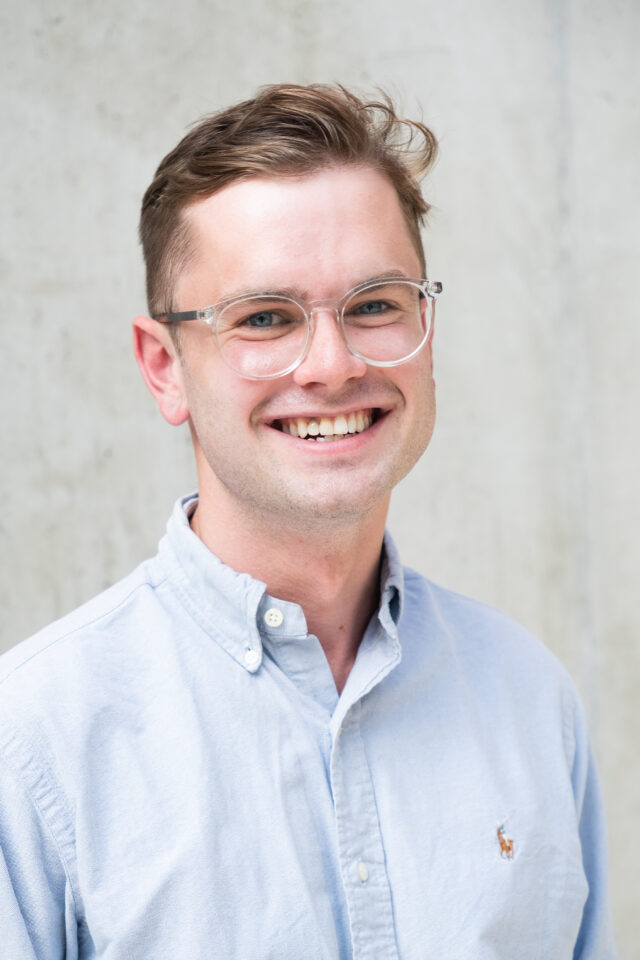
Why did you become a YQSS?
I joined the YQSS to explore the profound societal and ethical implications of second generation (and beyond!) quantum technologies. I aim to contribute to informed policy-making decisions and help shape public understanding of quantum technologies.
Favorite part of being a YQSS
The best part of joining the Young Quantum Social Scientists is the team: I have an incredible time learning from my fellow students and I always feel supported by the lab's leadership in continuing my learning journey.
Something interesting or valuable you have learned so far
There are no easy answers in the quantum world.
Nuria Quesada Perez
Nuria Quesada Perez is currently studying Biomedical Engineering and Medical Physics at the TUM. She has always been passionate about research in the medical field but she also enjoys learning about completely unrelated study areas. She is an active and curious person, always looking forward to getting to know new people and hobbies.

Why did you become a YQSS?
Quantum mechanics has always been a background topic throughout my studies, but I have never been actually involved in its world. Moreover, I have never had the opportunity to participate in anything related to political sciences. Being a YQSS has brought me the opportunity to combine these two interesting fields and be part of an interdisciplinary project in which people with different backgrounds help me extend my knowledge while having a joyful experience.
Favorite part of being a YQSS
I really enjoy spending time with the team and we are offered a broad range of opportunities to take part in events and seminars that I wouldn't be aware of if I wasn't a YQSS.
Something interesting or valuable you have learned so far
Basics of Quantum Technology, the impact that Quantum technologies are having nowadays and the consequent technological evolution that is needed, how to coordinate different teams within the same project, etc.
Rowan Crawford
Rowan Crawford is a Political Science student at the Technical University of Munich. He works as a student research assistant at the TUM School of Governance and the TUM School of Management. He is particularly interested in the development and governance of emerging technologies and economic and global justice.
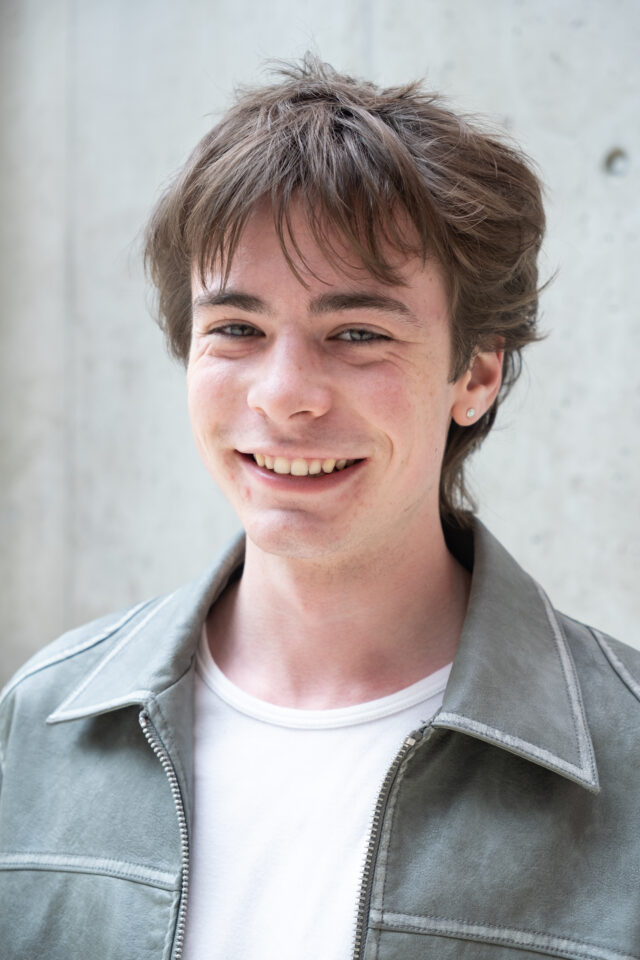
Why did you become a YQSS?
I joined the YQSS to work at the intersection of emerging technologies and governance. I am fascinated by quantum technologies and believe their development has massive transformative implications for science, economy, and society. As a member of the YQSS, I can research this interdisciplinary and cutting-edge field as it unfolds "in real-time."
Favorite part of being a YQSS
My favorite part of being a YQSS is working with and observing some of the brightest minds in quantum technology, economy, and social sciences. I am grateful to be a part of such an impressive research network.
Something interesting or valuable you have learned so far
During my time as a YQSS, I have been able to improve my stakeholder management skills, especially in a research context.
Are you curious to become a Young Quantum Social Scientist yourself?
Stay tuned as our new application phase for the scholarship program is starting soon!
How can we pave the way for a bright quantum future?
Last Thursday, PushQuantum started its semester program in collaboration with the Quantum Social Lab. We were pleased to welcome Ilyas Khan to the TUM Think Tank for this special day. The Founder and CPO of Quantinuum did not only join a panel discussion but also spent some quality time with the student’s club members.
One event highlight was the panel discussion, which centered around the future of quantum technologies. Ilyas Khan was joined by Robert Wille, professor at TU Munich and Chief Scientific Officer at the Software Competence Center Hagenberg, and Fabienne Marco, Head of the Quantum Social Lab and Project Lead of QuantWorld.
The panelists shared their perspectives on the future of quantum technologies, drawing from their diverse backgrounds spanning from the quantum computing industry over mathematics and political science to software development.
The panel moderator, Alexander Orlov (PushQuantum), challenged our panelists with questions ranging from the anticipated advancements and major challenges in quantum computing, including education and policy making, to personal experiences. In addition, he elicited rare advice from the panelists on how to accelerate the students’ careers in quantum technology-related fields in an impactful way.
Key takeaways included the importance of learning from past mistakes, finding suitable approaches for education within quantum technologies (and specifically quantum computing), and the need for interdisciplinary work in the field of quantum technology.
When asked about the future of quantum and what will be the crucial factor within further and fast development, Ilyas Khan suggested shifting the focus from coherence times to entropy. ‘I would say that of all the things that matter in the context of possible advantage, I’d encourage you to think of cross-entropy because it can be validated or not. [...] And I think this year, we will incontrovertibly pass that threshold. There is zero question in my mind.’
Talking about education and future talents, the ‘current challenge lies in matching the needs for different parts of the society and a more holistic and interdisciplinary approach within education,’ according to Fabienne Marco.
A common position the panelists had was the importance of changing the narrative within the media from fear to the opportunities connected with quantum technology.
Robert Wille pointed out how important it is to distinguish who is best equipped to solve different challenges: ‘When it comes to quantum computing software, computer scientists have to lead the way.’ Drawing from his personal experience, he also emphasized the importance of sometimes challenging yourself by entering new scientific bubbles to share solutions and avoid reinventing existing solutions in other disciplines.
Thanks to all the panelists for the insightful discussion!
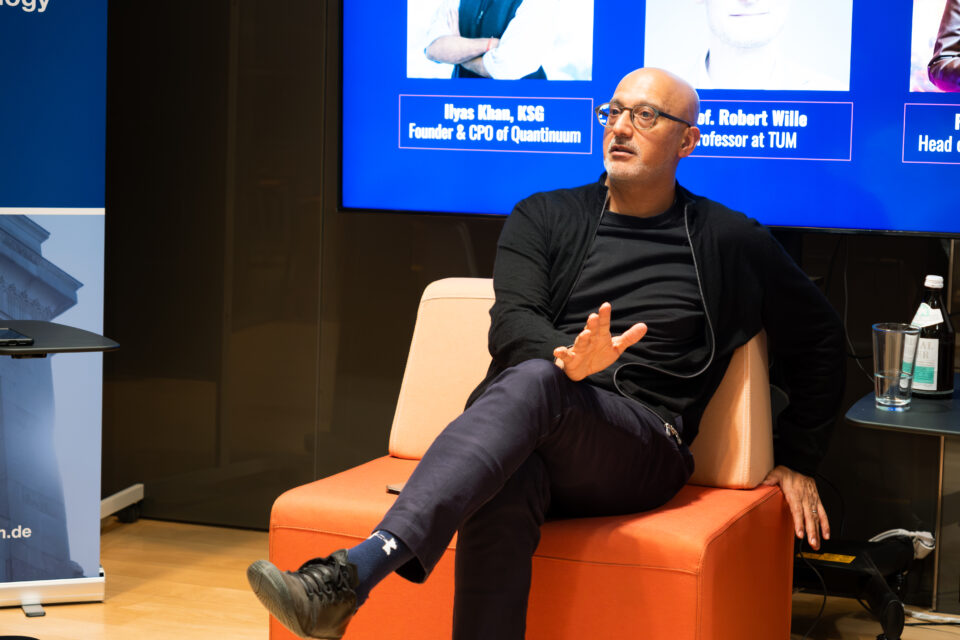
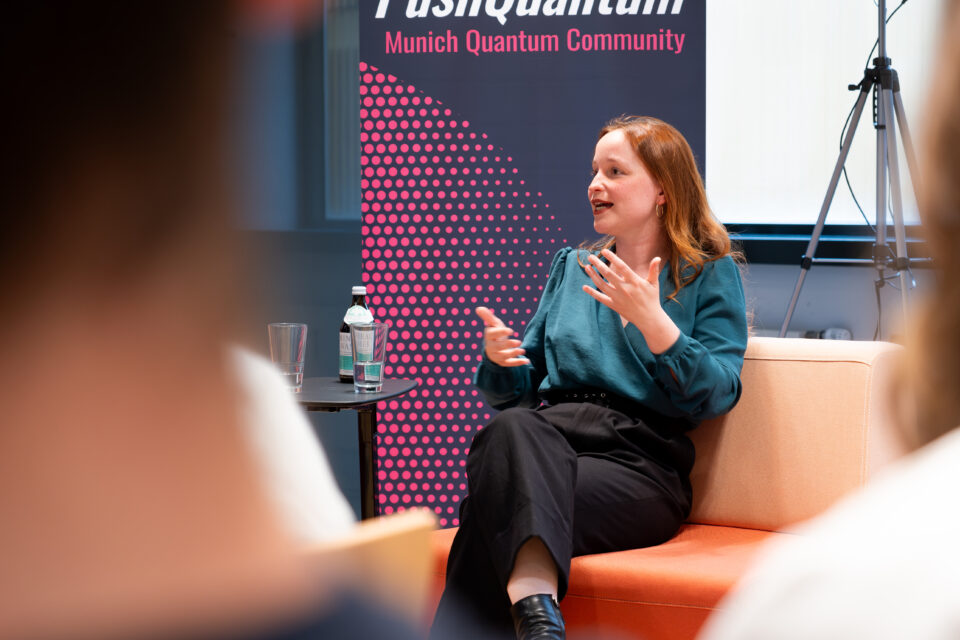

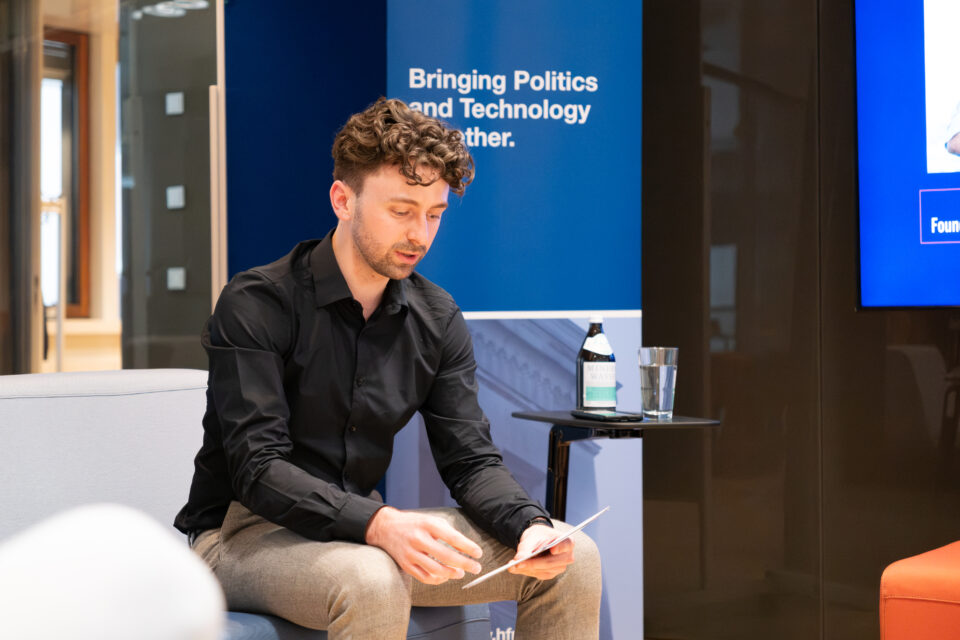
PushQuantum is a Munich-based student club which offers real world-focused education in quantum tech. Within TUM Think Tank's Public Policy Impact Program, PushQuantum focuses on actively contributing to shaping a responsible quantum future - a vision shared with the Quantum Social Lab.
Are you a passionate informatics student eager to contribute to an innovative learning platform? The Quantum Social Lab is looking for informatics students to do their interdisciplinary project (IDP) within our flagship project QuantWorld.
About the project
The aim of the project is to impart knowledge of quantum technologies 2.0 to target groups and to make them tangible. For this purpose, the module-based QuantWorld learning platform with certification options meets people in their respective living and working environments. The focus is on the living environments of mobility, banking and medicine.
In this project you work on the following topics:
- Create a digital learning platform for QuantWorld
- Integrate interactive modules into the digital learning platform
- Support on the creation of the QuantWorld website
- Create interactive presentation materials on the topic of quantum technology
- Cut science videos for the learning platform
- You are always welcome to contribute your ideas to the project!
Your benefits
- Integration in a interdisciplinary team of IDP students at TUM Think Tank.
- Build a network in an expert environment.
- Exchange ideas with various experts from the field of art, politics, architecture, physics,
games engineering and data science. - Better chances on the job market: After submitting your thesis or project work, you will
receive a reference certificate if required
More information
- ECTS credits, e.g. as part of a a compulsory or research internship.
- Opportunity to write thesis with TUM Think Tank.
- Work can be done from a remote position if required
- Start is flexible.
- The duration of work is flexible: but there a fixed dates.
- Voluntary participation in various workshops and lectures as part of the QuantWorld project
- Co-working in the heart of Munich with unlimited supply of coffee (personal use only)
Requirements
- Interest in the topic of quantum technology
- Good knowledge of programming websites (in particular wordpress), digital learning platforms and digital modules
- Intermediate knowledge or interest in cutting programs as Adobe Premiere
- Team player skills
- High motivation and independent way of working, proactive and self-organized
Interested in becoming part of the QuantWorld-project?
For questions and registration, please contact Alisha Ogidan.
